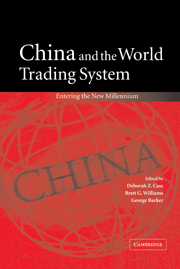Book contents
- Frontmatter
- Contents
- List of figures
- List of tables
- List of contributors
- Preface
- Acknowledgements
- Abbreviations and acronyms
- Introduction: China and the reshaping of the World Trade Organization
- PART I The world trading system
- PART II The accession
- PART III China – the domestic sphere
- PART IV Trade in goods
- PART V Trade in services and competition policy
- PART VI Intellectual property
- 18 Chinese trademark law and the TRIPs Agreement – Confucius meets the WTO
- 19 TRIPs goes east: China's interests and international trade in intellectual property
- 20 The impact of China's WTO membership on the review of the TRIPs Agreement
- PART VII Dispute settlement
- Select bibliography
- Index
20 - The impact of China's WTO membership on the review of the TRIPs Agreement
Published online by Cambridge University Press: 28 July 2009
- Frontmatter
- Contents
- List of figures
- List of tables
- List of contributors
- Preface
- Acknowledgements
- Abbreviations and acronyms
- Introduction: China and the reshaping of the World Trade Organization
- PART I The world trading system
- PART II The accession
- PART III China – the domestic sphere
- PART IV Trade in goods
- PART V Trade in services and competition policy
- PART VI Intellectual property
- 18 Chinese trademark law and the TRIPs Agreement – Confucius meets the WTO
- 19 TRIPs goes east: China's interests and international trade in intellectual property
- 20 The impact of China's WTO membership on the review of the TRIPs Agreement
- PART VII Dispute settlement
- Select bibliography
- Index
Summary
Introduction
The high-profile negotiations for the accession of China to the WTO have focused attention on how China may implement the obligations binding WTO members. Now attention is turning to the question of what impact China will have upon the WTO itself and upon WTO treaty law. This chapter asks that question specifically in the field of intellectual property, considering the impact that China's membership might have upon the evolution of the Agreement on Trade-related Aspects of Intellectual Property Rights (the TRIPs Agreement).
The TRIPs Agreement contains provisions that require WTO members to negotiate on possible changes or amendments to certain parts of the TRIPs Agreement. There are also matters that were the subject of negotiation in the Uruguay Round but which were left unresolved by the TRIPs Agreement as well as other matters that have arisen in the last five years that the TRIPs Agreement has been in force. The recent Ministerial Conference in Doha has emphasized the need for continued examination and reform of the TRIPs Agreement, and highlighted the role of the TRIPs Agreement in the protection of public health. This chapter reviews all of the subject-matter of mandatory WTO negotiations and the issues surrounding the Doha Declaration on the TRIPs Agreement and Public Health and offers some thoughts on how they may be affected by China's entry into the WTO.
China has only recently begun to regard intellectual property law as an important part of its legal infrastructure.
- Type
- Chapter
- Information
- China and the World Trading SystemEntering the New Millennium, pp. 363 - 384Publisher: Cambridge University PressPrint publication year: 2003
- 1
- Cited by



